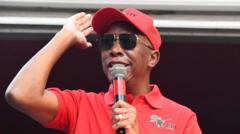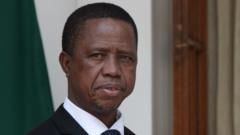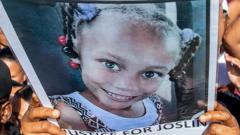The revelation of Pope Leo XIV's diverse Creole roots fosters a sense of belonging and representation for many Catholics worldwide.
**Pope Leo XIV’s Heritage Sparks Joy and Connection Among Global Catholics**

**Pope Leo XIV’s Heritage Sparks Joy and Connection Among Global Catholics**
The election of Pope Leo XIV, the first American-born pontiff, evokes cultural pride and hope among Catholics, particularly from African and Caribbean communities.
Pope Leo XIV made his historic debut on the balcony of St. Peter’s Basilica on Thursday, immediately igniting discussions about his vibrant cultural background. The Rev. Lawrence Ndlovu from Johannesburg expressed intrigue, noting, "You’re not the classical white sort of person." Many viewers around the globe, particularly those in Africa and nations with significant African heritage, felt a deeper connection to the new pontiff, believing he embodies aspects of their identity.
The anticipation surrounding his appointment has led to celebrations within the Catholic community, especially among those recognizing Leo's ancestry linking to Creole culture in New Orleans. Father Ndlovu articulated this sentiment, stating, "He’s not foreign to us. There is a part of him that is also us," capturing the essence of how Pope Leo’s background resonates with a large audience.
Despite the enthusiasm, details about Pope Leo's ancestry remain subtly unclear. Historical documents indicate varying origins for his maternal grandfather, with roots traced to the Dominican Republic, "Hayti," or even Louisiana. Furthermore, there are accounts of his grandparents as Black or mulatto, originating from the Seventh Ward of New Orleans—a culturally rich area with a blend of African, Caribbean, and European legacies.
Research by Edwin Espinal Hernández, a genealogist at the Pontificia Universidad Católica Madre y Maestra, suggests that the pope's grandfather may have been born in Port-au-Prince, Haiti, further enriching the narrative of his heritage.
As Pope Leo XIV begins his papacy, the significance of his diverse background not only marks a turning point in the history of the Catholic Church but also brings hope for greater representation and advocacy among marginalized communities worldwide.
The anticipation surrounding his appointment has led to celebrations within the Catholic community, especially among those recognizing Leo's ancestry linking to Creole culture in New Orleans. Father Ndlovu articulated this sentiment, stating, "He’s not foreign to us. There is a part of him that is also us," capturing the essence of how Pope Leo’s background resonates with a large audience.
Despite the enthusiasm, details about Pope Leo's ancestry remain subtly unclear. Historical documents indicate varying origins for his maternal grandfather, with roots traced to the Dominican Republic, "Hayti," or even Louisiana. Furthermore, there are accounts of his grandparents as Black or mulatto, originating from the Seventh Ward of New Orleans—a culturally rich area with a blend of African, Caribbean, and European legacies.
Research by Edwin Espinal Hernández, a genealogist at the Pontificia Universidad Católica Madre y Maestra, suggests that the pope's grandfather may have been born in Port-au-Prince, Haiti, further enriching the narrative of his heritage.
As Pope Leo XIV begins his papacy, the significance of his diverse background not only marks a turning point in the history of the Catholic Church but also brings hope for greater representation and advocacy among marginalized communities worldwide.




















